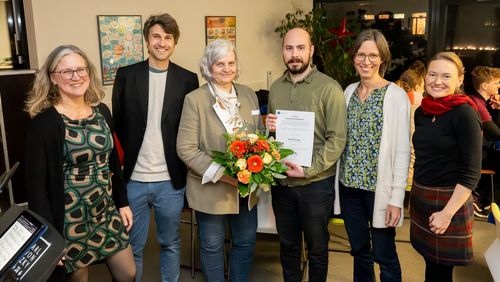More than 220 graduates from 62 countries - that is the impressive interim balance of the European Master course in Migration and Intercultural Relations (EMMIR) after a decade. The European excellence programme Erasmus Mundus now continues to fund the course coordinated by the University of Oldenburg, with around 5.2 million euros for another five years.
Since 2011, the University of Oldenburg has been offering the Master course together with four European, three African and, from this year onwards, two Indian partner institutions. Students enrolled in EMMIR are made familiar with theories, concepts and methods in the field of migration studies across disciplines and also gain practical experience. The University of Oldenburg is the only university in Lower Saxony to coordinate such a master course.
"EMMIR brings students from all over the world to Oldenburg," says Prof. Dr Karsten Speck, the university’s Vice President for Instruction and International Affairs. "We are very happy to continue the programme and thus continue to educate students who address questions about migration and related socio-political challenges from different perspectives."
"Migration processes have a major impact on our societies," explains cultural studies scholar Prof. Dr Martin Butler, who is responsible for the project. "Thanks to our large international network, which brings together people from very different regions and contexts, students learn to look at the topic from various points of view."
A European Success Story
In 2019, EMMIR became one of the first to be included in the European Register for Quality in Higher Education and was recognized by the European Commission as a "success story" and "good practice example". It focuses on four major themes, explains Dr. Lydia Potts, the consortium’s coordinator. "The course is concerned with issues of conflict resolution and social justice, processes of knowledge production, or aspects of gender and diversity, among others."
At the heart of the course is the mobility of the students themselves: A cohort’s students spend the first semester together in Oldenburg, the second together at the University of Stavanger (Norway). This is followed by a project phase in which students individually choose a module at one of the nine partner institutions. Students complete their studies in the fourth semester with a master's thesis in a freely chosen partner country.
Approximately 400 applications for the programme are received annually from all over the world. The project coordination and the partner institutions carefully select 30 students in an elaborate process. Previous graduates have gone on to work successfully in renowned international organizations, such as the United Nations Refugee Agency or Médecins Sans Frontières, or in national government organizations.
A joint degree from all partner institutions
For the future funding period, the project partners have already planned summer schools as well as conferences in Sudan, India and Oldenburg in addition to the regular curriculum. A good half of the funding will go toward a total of 84 full scholarships for 24 months each. The second part of the funding will be used by the partners to implement the programme on site. 120,000 euros are available for students with special needs.
Since the first graduating class, EMMIR has been awarding a so-called joint degree from all partner institutions. This makes the programme one of the world's excellent transnational master's programs with a double, multiple or joint degree (Erasmus Mundus Joint Master Degrees EMJM). Such study programmes are aimed at outstanding students from all over the world.
In addition to the nine institutions, the EMMIR programme maintains exchanges with 34 associated partners in 15 countries, including universities and research centres that contribute to teaching, research and supervision in areas underrepresented in the consortium. The EMMIR network also includes 16 partners from the working world, such as governmental organizations and international organizations or non-governmental organizations.



![[Translate to English:] Group picture of EMMIR students on the Campus of the University of Oldenburg.](https://www.prizepapers.de/f/prizepapers/_processed_/7/5/csm_emmir_gabriella_mikiewicz_d23396c2c9.jpg)


